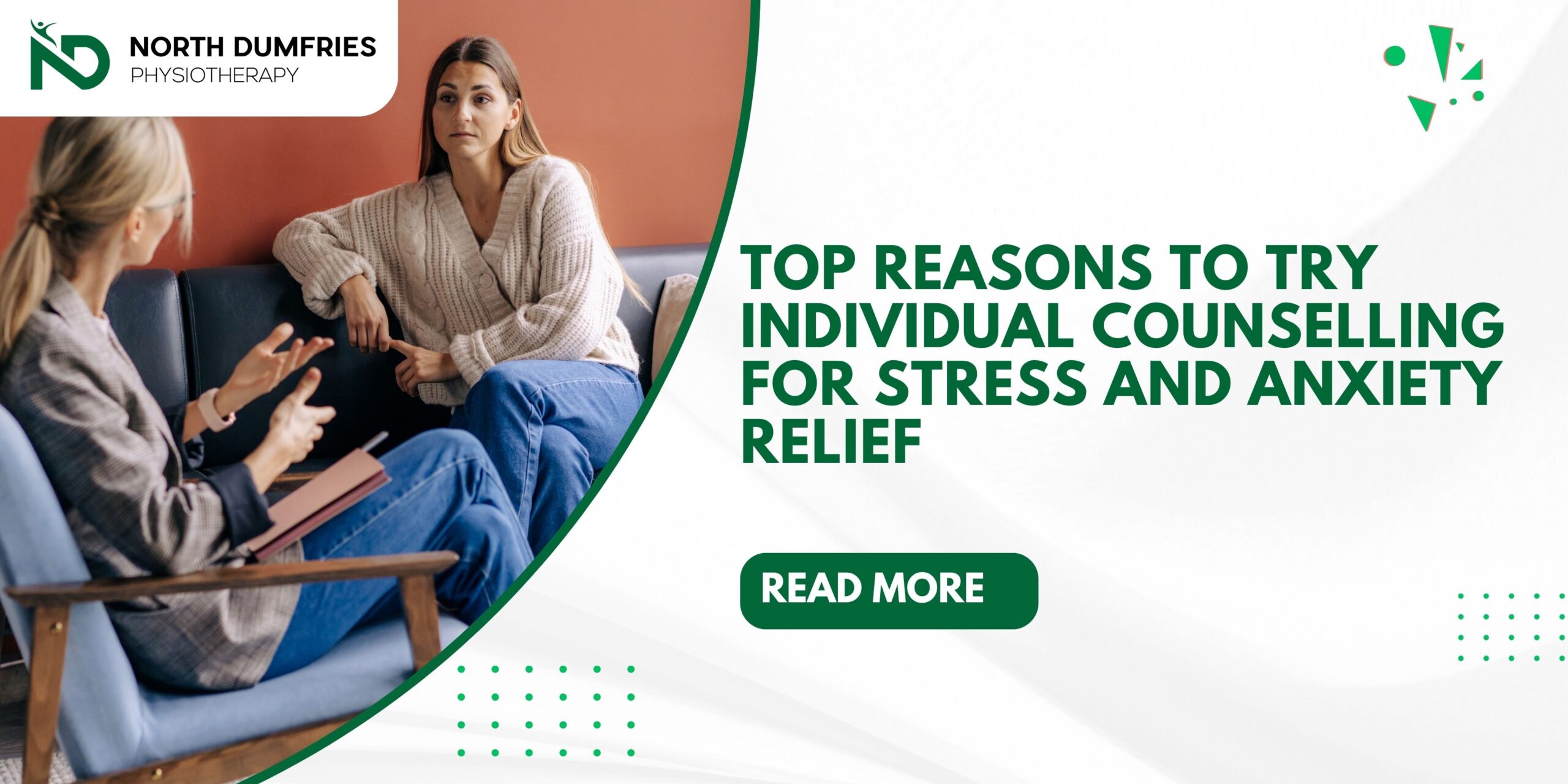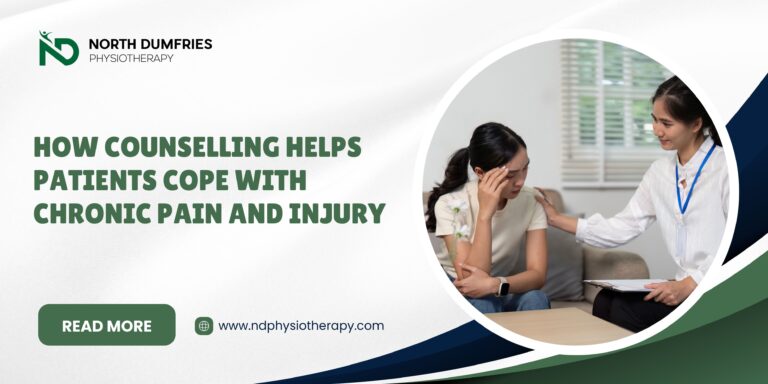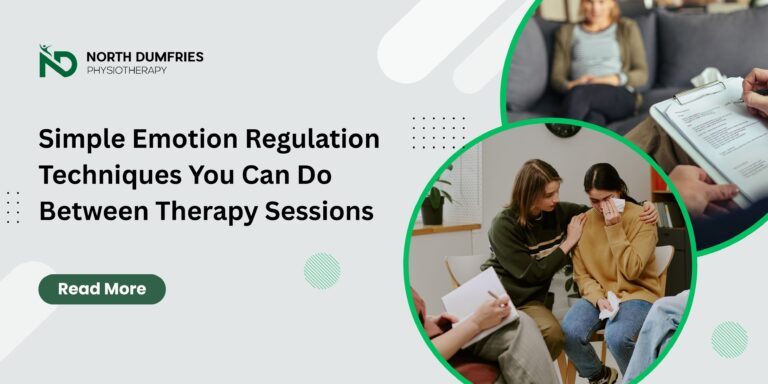Feeling anxious or stressed can affect how you think, sleep, and interact with others. The best reason to try individual counselling for anxiety relief is simple, as it helps you understand what’s driving your stress and gives you practical tools to manage it. Unlike quick fixes, counselling focuses on long-term emotional balance and everyday coping.
Many people face anxiety or stress at some point in life. According to Statistics Canada, nearly one in five Canadians experiences a mood or anxiety disorder each year, but fewer than half reach out for help. Counselling bridges this gap. It gives you a safe space to talk, learn strategies, and feel better equipped to handle life’s ups and downs.
1. Counselling Builds Real Skills
One of the strongest benefits is that it teaches lifelong coping skills. Medications can reduce symptoms, but therapy helps you identify the cause and handle triggers better.
During mental health therapy sessions, counsellors guide you through practical techniques like reframing negative thoughts, grounding exercises, and structured problem-solving. These are not abstract ideas; they are everyday skills that improve emotional control.
Studies show that Cognitive Behavioural Therapy (CBT) is one of the most common approaches used in this. It is as effective as medication for many anxiety disorders. It helps retrain your thought patterns, giving you tools to manage anxiety independently in the long run.
2. Noticeable Change Can Happen in a Few Sessions
Many people believe counselling takes years to work. That’s a myth. Modern stress management counselling focuses on short-term, results-driven approaches. Research published in 2023 found that even six sessions of structured CBT can significantly reduce anxiety and depression symptoms. This means you can start feeling more in control within weeks.
Short-term therapy doesn’t skip depth; it condenses the process. Each session has clear goals, such as identifying stress triggers or building relaxation routines. Over time, small wins build confidence and motivation to keep improving.
3. Counselling Helps Rewire Your Body’s Stress Response
Stress doesn’t just live in your mind. It shows up in your body with tight muscles, headaches, shallow breathing, and constant fatigue. Anxiety coping therapy helps you reset this pattern. Techniques like guided breathing, muscle relaxation, and mindfulness lower your body’s “fight or flight” reaction. You start responding to stress calmly instead of reacting out of panic.
Counselling also introduces body-based awareness. When you learn to notice early signs of tension, you can act before anxiety spirals. That self-awareness improves both emotional and physical well-being.
4. A Private Space to Talk Without Judgment
One reason people avoid sharing their struggles is fear of judgment. Individual counselling for anxiety and stress provides a safe and confidential space where you can be open without worrying about being misunderstood.
A counsellor listens without bias and helps you organize your thoughts, making sense of emotions that may have felt confusing for years.
In counselling, it is not about being told what to do. It is about discovering what works for you. That process helps build self-trust and emotional independence.
5. Counselling Supports Physical Health and Recovery
Stress and anxiety affect the body in powerful ways. Chronic stress can raise blood pressure, reduce immunity, and even delay physical recovery.
Integrating anxiety treatment counselling with medical or physiotherapy plans often improves outcomes. When anxiety is managed, people follow exercise routines better, sleep more soundly, and experience fewer incidents of chronic pain.
Research supports this link. Studies show that addressing mental health during physical rehabilitation leads to faster healing and stronger motivation. It is another example of how mind and body work together and how counselling strengthens that connection.
7. Improved Focus, Sleep, and Productivity
Anxiety and stress affect more than mood. They reduce focus, lower energy, and disturb sleep. These issues can impact relationships and work performance.
Through stress management counselling, you learn tools that sharpen concentration and improve daily functioning. A calmer mind makes decisions more clearly and handles pressure better.
According to Anxiety Canada, poor mental health costs the country over $50 billion each year in healthcare expenses and lost productivity. Seeking help is not just emotional maintenance, it is a practical step toward better living.
8. What to Expect in Your First Session
Starting counselling can feel intimidating, but the first session is simple. You will discuss your goals, daily challenges, and what you hope to change. The counsellor may ask about sleep, lifestyle, and stress triggers. You will likely leave with one or two small techniques to try, like a breathing exercise or a thought-recording method. It is not about solving everything at once; it is about starting a process that grows with you.
FAQs
1. How many sessions do I need to feel better?
Everyone’s timeline is different, but many people notice improvement within 4–6 sessions. Short-term therapy programs can be just as impactful as long-term ones if attended consistently.
2. Is online counselling as good as in-person therapy?
Yes. Research shows that video-based sessions produce similar results to face-to-face meetings. What matters most is comfort, trust, and regular participation.
4. Can counselling help with both stress management and physical tension?
Absolutely. Stress often creates muscle tension, headaches, or fatigue. Counselling helps you manage the emotional cause, which naturally reduces these physical effects.
5. What if I am nervous about opening up?
It is normal to feel anxious before your first session. Counsellors are trained to create a safe, non-judgmental space. You can control what you are sharing and when you share it.
Conclusion
Managing anxiety and stress is not about being stronger. It is about being supported. Individual counselling for anxiety relief offers a structured way to understand your mind, calm your body, and reclaim control over your life.
Whether you start with one conversation or a full program, each step toward counselling is a step toward peace of mind. If you are ready to feel lighter and more confident, ND Physiotherapy offers professional counselling options designed to support your emotional and physical well-being.








